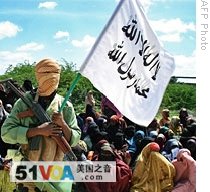Nairobi
22 June 2009
Kenya's prime minister says the government is not ready to say whether the country's military will intervene in the conflict in neighboring Somalia. Kenya and other countries in the region are under intense pressure from the Somali government to send troops into Somalia to keep Islamist militants there from taking power.
 |
| Kenyan PM, Raila Odinga (file photo) |
"The situation right now is very crucial because the campaign is around Mogadishu itself. If Mogadishu falls, the consequences would be very grave indeed," Mr. Odinga said. "We are pledging our full support to the government. We are discussing this issue and are going to make consultations. Announcements are going to be made."
Prime Minister Odinga says among the resolutions guiding the African Union and the six-member, east African Intergovernmental Authority on Development, are rules that restrict nations from interfering in the internal affairs of their neighbors. Mr. Odinga suggested that a better solution for Somalia would be for the international community as a whole to send immediate military assistance.
The Kenyan leader's comments stopped short of the commitment the U.N.-supported Somali government had hoped to receive from one of its staunchest allies in the region. On Saturday, the government made an extraordinary appeal, urging neighboring countries - Djibouti, Ethiopia, Kenya, and Yemen - to militarily intervene in Somalia to keep the country from falling into the hands of Islamic extremists allied with al-Qaida.
Since May, government and pro-government forces have been battling ferocious insurgent attacks in Mogadishu and elsewhere, led by al-Qaida-linked al-Shabab. About 4,300 African Union peacekeeping troops are in the capital protecting the presidential palace and key installations. But they have no mandate to pursue the insurgents.
Al-Shabab, listed by the United States as a terrorist organization, has vowed to topple the pro-western government and turn Somalia into an ultra-conservative Islamic state. The Somali government says hundreds of foreign fighters, battle-hardened in Iraq and Afghanistan, are now pouring into the country to help al-Shabab.
 |
| Al-Shebab fighter guards a crowd in Mogadishu during a court session run by the Islmaist group, 22 Jun 2009 |
Kenya suffered al-Qaida-related terrorist attacks in 1998 and 2002. Anti-terrorism officials here say one of the top commanders of the foreign fighters in Somalia is Kenyan-born Ali Saleh Nabhan, who is believed to have been involved in all successful and foiled attacks against Kenya in the past 11 years.
On Sunday, the spokesman of the al-Shabab-run administration in Kismayo in southern Somalia, Hassan Yaqub, warned Kenya that if any Kenyan troop is found across the border in Somalia, al-Shabab would send suicide bombers to attack the downtown area of Nairobi.
Yaqub says the people in downtown Nairobi will meet the same fate as Somalia's security minister Omar Hashi Aden, who was killed along with dozens of others in a suicide blast last Thursday at a hotel in Beledweyne.
Kenyan Prime Minister Odinga declined to comment on the al-Shabab threat.
There has been no official response from Djibouti or Yemen about the Somali request for troops. But Ethiopia says that it would only intervene under a mandate from the international community. Ethiopia ended a widely unpopular military occupation of Somalia in January under a U.N.-sponsored peace deal signed in Djibouti.
Residents in several border towns in Somalia say Ethiopian troops are already back in their villages, conducting security operations.